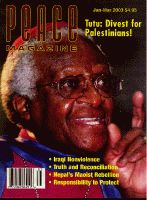
Peace Magazine Jan-Mar 2003, page 27. Some rights reserved.
Search for other articles by John Bacher here
Johan Galtung, Carl G. Jacobsen, Kai Frithjof Brand-Jacobsen. Pluto Press, Second edition published 2002
A towering prophetic figure in developing strategies towards a global democratic peace, Gene Sharp, in his cautionary book, Social Power and Political Freedom, warns that "we must abandon repetition of our sweeping sloganized solutions...which we recite without thinking in face of our problems as if they were incantations to ward off evil spirits." The great strength of Searching for Peace is that it has many brilliant insights which challenge simplistic, but commonly shouted mantras. Its weakness however, is that its many flashes of genius are dulled by repetitions of tired mantras, such as "the right of self-determination," "globalization-free zones" and, most unfortunately, a repeat of Lenin's old chestnut of "the prison of nations."
Searching for Peace is most impressive when it deals with issues which is authors, especially Johan Galtung, have been struggling with for many years with profound empathy and command of key factual details. We learn for instance, of Galtung's brave role in fostering Norway's provisions for alternative military service. Now a model for nations around the world from its provisions to require peace work as a substitute for military duty, it was achieved through Galtung's serving a severe prison term. Likewise we learn of Galtung's remarkable work in the American south to promote racial tolerance during the battles over desegregation in the 1950s.
My favorite part of Searching for Peace deals with Galtung's recommendations for defending the rights of the Sami, a nation commonly known as Lapps. Their earth respecting reindeer herding culture straddles parts of northern Norway, Sweden, Finland and Russia. It is frequently in conflict with the nuclear industry, defence establishments and resource extraction industries.
For the Sami, a culture with deep roots in Galtung's native Norway, Searching For Peace suggests that they be compensated for the past abuse of their lands. Rather than advocating a separate state, based on dogmas such as self-determination," we are told that the "transcend" perspective urges that, "Sami parliaments should be established in all four states with a right to veto any exploitation of natural resources within their traditional territories. This should include waterfalls, mining, fishing, oil and gas resources on land, in rivers, as well as in the Barents Sea and the respective sectors of the North Atlantic." He suggests that this homeland would be demilitarized and that the Sami be exempted from military service.
Rich in productive detail in suggesting how to protect the Sami without unleashing the Pandora's box of separatism, Galtung vision falters however, when it is applied to more distant lands, in which he has lived as a short time observer. This causes him to recommend dangerous remedies based on separatism, the concept of self-determination and also explosive suggestions for the merging of existing states. Sometimes these recommendations are put forward in inconsistent ways. For instance, in a 1997 proposal regarding Ulster, the "Transcend" perspective makes the imaginative proposal for an Anglo-Irish condominium for this region. This is an interesting and thoughtful idea, since it could be used to strengthen the rights of Ulster's Catholics, which are often trampled on by the region's Protestant majority. At the same time however, Galtung stresses "the right of Ulsterites to self-rule." This concept could very well justify the most extreme violations of the rights of the Catholic minority.
To their credit, Galtung, Jacobson, and Brand-Jacobson incorporate every practical route towards peace in their provocative book. It is full of references, for instance, of the need for the rule of law and respect for civil liberties. They even make the bold suggestion that a durable peace in Cuba would be helped by the introduction of a multiparty system.
Searching for Peace paints a colorful tapestry of the promises and challenges to peace. It shows for instance, the similarity between the September 11th attacks by what he terms "Islamo-fascism" and the similar anti-democratic assault by the Chilean airforce on the Presidential Palace of Salvador Allende. He notes that the number of victims, approximately 4,000 were the same, and that both assailants were hostile to the democratic systems of government in Chile and the United States.
In reading Searching for Peace one cannot but stand in awe of the assembled achievements of the authors. At the same time however, they need to apply more discipline and coherence to their writing and so illuminate the minute details of building civil society, democracy, non-violently opposing dictatorships, and protecting the rule of law.

Peace Magazine Jan-Mar 2003, page 27. Some rights reserved.
Search for other articles by John Bacher here